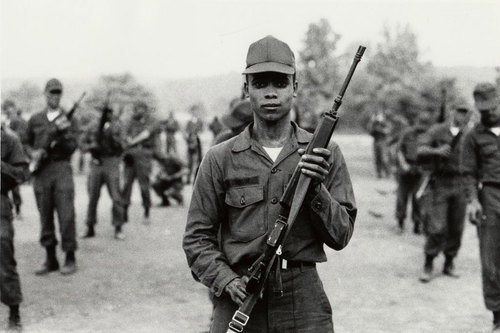Frederick Wiseman
dal 19/1/2010 al 30/12/2010
Segnalato da
19/1/2010
Frederick Wiseman
The Museum of Modern Art - MoMA, New York
To celebrate the recent acquisition of newly struck prints of thirty-six films by Frederick Wiseman, The Museum presents a comprehensive retrospective of the director's work. Featuring three to four films each month, this yearlong survey opens with Basic Training (1971), followed by a conversation with Wiseman and curator Josh Siegel, and spans his entire career, from Titicut Follies (1967) to his two most recent projects, La Danse-The Paris Opera Ballet (2009) and Boxing Gym (2010).

Organized by Joshua Siegel
To celebrate the recent acquisition of 36 newly struck prints of
films by Frederick Wiseman (American, b. 1930), The Museum of Modern Art presents a
comprehensive retrospective of the director’s work, from January 20 through December 31, 2010.
Featuring three to four films each month, this yearlong survey opens on January 20, when
Frederick Wiseman introduces Basic Training (1971), followed by an onstage conversation. The
exhibition spans his entire career, from Titicut Follies (1967) to his two most recent projects, La
Danse—The Paris Opera Ballet (2009) and his forthcoming Boxing Gym (2010). Frederick
Wiseman is organized by Joshua Siegel, Associate Curator, Department of Film, The Museum of
Modern Art.
For more than four decades, Wiseman has used a lightweight 16mm camera and portable
sound equipment to study human behavior in all its contradictory and unpredictable
manifestations, particularly in institutional or regimented situations in which authority creates an
imbalance of power, or democracy is at work. Like the great novelists of the nineteenth century,
Wiseman combines epic narrative with intimate portraiture. His films comprise a grand panorama
of American life (and, more recently, the cultural life of Paris)—a kind of modern-day comédie
humaine that never loses its vitality or its currency.
Often caustically funny—and always urgent and vexing—Wiseman’s films have centered on
certain abiding themes: the military (Basic Training; Sinai Field Mission, 1978; Manoeuvre, 1979;
and Missile, 1987); the relationship between humans and animals (Primate, 1974; Meat, 1976;
Racetrack, 1985; and Zoo, 1993); education (High School, 1968; Blind, 1986; Deaf, 1986; Multi-
Handicapped, 1986; and High School II, 1994); medicine (Hospital, 1969; and Near Death, 1989);
law and order (Law & Order, 1969; Juvenile Court, 1973; Domestic Violence 1, 2001; Domestic
Violence 2, 2002; and State Legislature, 2006); the arts (Ballet, 1995; La Comédie-Française,
1996; and La Danse—The Paris Opera Ballet); fashion (Model, 1980; and The Store, 1983);
religion and faith (Essene, 1972); and sports and leisure (Racetrack, 1985; Central Park, 1989;
Aspen, 1991; and his forthcoming Boxing Gym).
Wiseman’s debut film, Titicut Follies, is a landmark of nonfiction cinema, exposing the
horrifying conditions at a state prison hospital for the criminally insane. It is still the only film
ever to have been censored by a U.S. court for reasons other than national security or obscenity.
His absurdist masterpiece Welfare (1975) is a purgatorio of crippling bureaucracy that culminates
in one man’s unforgettable monologue about ―the whole rigmarole of forms—papers, papers,
papers‖ (unsurprisingly, Wiseman would later adapt Welfare into an opera). Belfast, Maine (1999)
is his poignant study of a New England port town that has fallen on hard times—a portrait of
lobstermen and factory workers, shop owners and city officials, doctors, judges, and teachers—
and a profound meditation on American resiliency, faith, and industry.
Wiseman’s La Dernière Lettre (The Last Letter) (2002) is based on an epistolary chapter
from Life and Fate, the posthumously published epic novel by the Soviet writer Vasily Grossman.
Filmed on a stark and shadowy French stage to evoke a Nazi-occupied Ukrainian ghetto in 1941,
the film centers on Catherine Samie’s devastating performance as Anna Semionova, a physician
who dictates one final letter to her son before facing certain death.
Though Wiseman approaches his subjects—doctors, ballet dancers, soldiers, students,
welfare recipients, factory workers, fashion models, politicians, zookeepers, victims of domestic
violence, Benedictine monks, the terminally ill—with a minimum of intrusion or influence, he
brings a sensitive but trustworthy eye, a lawyer’s penetrating skepticism, and the dramatic
impulses of a storyteller to arrive at what Eugène Ionesco, one of his favorite playwrights, called
an ―imaginative truth.
Image: Basic Training (1971). USA. Directed, produced, and edited by Frederick Wiseman. Courtesy of Zipporah Films.
Related Film Screenings
http://www.moma.org/visit/calendar/films/1028
Press Contact: Meg Blackburn, (212) 708-9757, meg_blackburn@moma.org
Opening Wednesday, January 20, 2010
7:00 p.m Basic Training Film Screenings
Followed by a discussion between Wiseman and curator Josh Siegel
The Museum of Modern Art - MoMa
11 West 53 Street, New York
The Roy and Niuta Titus Theaters
Hours: Wednesday through Monday: 10:30 a.m.-5:30 p.m. Friday: 10:30
a.m.-8:00 p.m., Closed Tuesday
Museum Admission: $20 adults; $16 seniors, 65 years and over with I.D.;
$12 full-time students with current I.D. Free for children 16 and under. Free for members.
Admission includes admittance to Museum galleries and film programs.
Free admission during Target Free Friday Nights 4:00-8:00 p.m.



